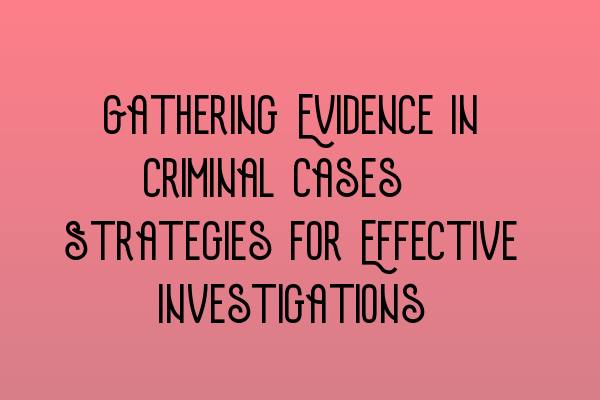Gathering Evidence in Criminal Cases: Strategies for Effective Investigations
When it comes to criminal cases, gathering evidence is the foundation of a strong defense or prosecution strategy. Building a compelling case requires a comprehensive approach that involves collecting, analyzing, and presenting evidence in a way that supports your argument. In this article, we will explore some strategies for conducting effective investigations and gathering the evidence you need to secure a favorable outcome in criminal cases.
The Importance of Thorough Investigation
An effective criminal defense or prosecution begins with a thorough investigation. Gathering evidence is often a time-sensitive process, requiring attention to detail and a methodical approach. By conducting a comprehensive investigation, you can uncover crucial information, identify potential witnesses, and develop a solid understanding of the case at hand.
Key Strategies for Gathering Evidence
1. Document Review: Start by thoroughly reviewing all the available documents related to the case. This includes police reports, witness statements, forensic reports, and any other relevant documentation. Look for inconsistencies, missing information, or potential leads that require further investigation.
2. Witness Interviews: Interviews with witnesses can provide valuable insights and help corroborate or challenge other evidence. Conduct interviews in a structured and systematic manner, documenting the conversations and obtaining signed statements whenever possible. Remember, witness testimony can be a powerful tool in court, so it’s essential to gather information that strengthens your case.
3. Forensic Analysis: In many criminal cases, forensic evidence plays a crucial role. Engage the services of qualified forensic experts to analyze and interpret the evidence. Whether it’s DNA analysis, fingerprint examination, or ballistics testing, a thorough forensic analysis can uncover hidden clues and give you a deeper understanding of the case.
4. Surveillance and Monitoring: Depending on the nature of the case, surveillance and monitoring can provide valuable evidence. Use specialized techniques and technology to capture audio, video, or photographic evidence that supports your position. However, it’s crucial to ensure that all surveillance activities comply with legal and ethical standards.
5. Expert Consultation: Consult with experts in relevant fields to gain a deeper understanding of complex technical or scientific evidence. Their expertise can help you analyze the evidence effectively and present it in a way that is easily understandable to the court and the jury.
Utilizing Technology for Effective Investigations
With advancements in technology, investigators have access to various tools and resources that can streamline and enhance the evidence gathering process. Here are some ways technology can assist in conducting effective criminal investigations:
– Digital Forensics: Digital devices such as smartphones, computers, and hard drives often contain valuable evidence. Digital forensics allows investigators to extract, analyze, and interpret data from these devices, uncovering crucial information that may be pivotal to the case.
– Data Analysis Tools: Analytical tools and software can assist in processing large volumes of data, identifying patterns, and extracting meaningful insights. These tools can help investigators spot connections, uncover hidden relationships, and build a stronger case.
– Surveillance Technology: Advanced surveillance systems, including CCTV cameras, tracking devices, and audio recording equipment, can provide invaluable evidence in criminal investigations. Surveillance technology allows investigators to capture real-time information and monitor suspects discreetly.
By leveraging these technological advancements, legal professionals can conduct more efficient and effective investigations, ultimately enhancing their ability to gather compelling evidence to support their case.
Conclusion
Gathering evidence in criminal cases requires a meticulous and strategic approach. By conducting thorough investigations, utilizing key strategies, and leveraging technology, legal professionals can enhance their chances of success in the courtroom. Remember to always follow ethical and legal guidelines during the evidence gathering process to ensure the admissibility and reliability of the evidence.
For more information on SQE 1 Practice Exam Questions, SQE 1 Practice Mocks FLK1 FLK2, SQE 2 Preparation Courses, SQE 1 Preparation Courses, and SRA SQE Exam Dates, please visit the following links:
- SQE 1 Practice Exam Questions
- SQE 1 Practice Mocks FLK1 FLK2
- SQE 2 Preparation Courses
- SQE 1 Preparation Courses
- SRA SQE Exam Dates
